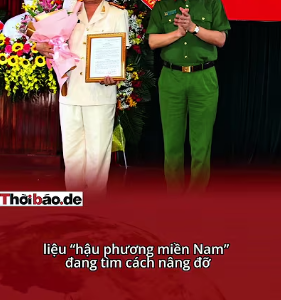
As soon as China announced official implementation of the Law on Maritime Traffic Safety in the South China Sea (Vietnam calls it the East Sea) which took effect from September 1, the US Department of Defense on the same day spoke out that it only considers this act threatening freedom of to navigation and hindering free trade and the rights and interests of countries in the sea as well as other coastal states.
AsiaNews on September 2 quoted a spokesman for the US Department of Defense as saying that the United States reaffirmed China’s illegal maritime claims, including in the South China Sea, pose a serious danger and threat to the freedom of navigation, overflight and commerce of countries in the region.
In a notice by the China Maritime Safety Administration, Beijing required foreign ships entering China’s „territorial waters“ to report information to the China Maritime Safety Administration. Specifically, submarines, nuclear ships, ships carrying radioactive materials, ships transporting oil, chemicals and other toxic substances … when passing through China’s territorial sea, they must declare their names, numbers, and locations and the time to the places to be docked.
China’s new regulation is said to go against the principle of the 1982 International Convention on the Law of the Sea, which grants foreign ships the right to so-called „innocent passage“ in other countries‘ territorial waters.
CSIS experts – Center for Strategic and International Studies in Washington said that the introduction of the new regulation by China’s Maritime Security Administration merely demonstrates Beijing’s power and challenge to international decisions that they never wanted to accept.
On September 1, an article published in the Australian Financial Review, titled „Australia rejects Beijing’s bid to tighten grip on South China Sea,“ the Australian Department of Defense emphasized that any similar maritime regulations must comply with the requirements of international law, especially the United Nations Convention on the Law of the Sea (UNCLOS). The Australian Navy will defy China’s new decree that foreign ships entering „China’s territorial waters“ will have to declare their presence, while insisting that Australian warships will continue to exercise their right of maritime freedom in accordance with international law.
In Vietnam, during a press conference held on September 1, when asked by reporters about China’s move, Foreign Ministry’s Spokeswoman Le Thi Thu Hang, still with the usual statement when raising the issues regarding the East Sea, said that „Countries need to strictly comply with the international treaties to which they are members, especially the 1982 United Nations Convention on the Law of the Sea (UNCLOS) – the legal framework for all activities on the seas and oceans, when promulgating domestic law documents related to the sea.”
Le Thi Thu Hang continued to affirm that Vietnam resolutely and persistently takes measures in accordance with international law to enforce and protect Vietnam’s sovereignty over the Hoang Sa (Paracels) and the Truong Sa (Spratlys); sovereignty, sovereign rights and jurisdiction over its waters are determined in accordance with the provisions of UNCLOS.
New Regulation-Old Strategy
RFA had a conversation with researcher Tran Thi Bich, Southeast Asia Program of the CSIS Center for Strategic and International Studies in Washington DC. Ms. Tran Thi Bich said that the regulation itself is new, but China’s strategy is not new:
“Over the years, Beijing has systematically consolidated its claims in the South China Sea. These include the introduction of the Law on Territorial Sea and Contiguous Zone in 1992, the publicization of the nine-dash line in 2009, and the establishment of Sansha City as a provincial city to manage the South China Sea in 2012. In addition, by systematically, China has harassed and obstructed the oil and gas exploitation activities of Vietnam and other central countries in the region. This new regulation is part of China’s cross-cutting strategy.“
Regarding Vietnam’s official response, through the spokesperson of the Ministry of Foreign Affairs Le Thi Thu Hang, was often considered by the domestic online community as weak and perfunctory, researcher Tran Thi Bich replied:
“From old time immemorial, not only when expressing concern about China’s actions but also when supporting claims in its favor in the East Sea, Vietnam has always avoided naming any of the countries in the South China Sea by name in its statements. The Foreign Ministry’s statement this time about China’s new law is no exception.“
China again uses „ambiguous“ tactics
Earlier, Vietnam’s state-controlled media quoted researcher Tran Cong Truc, former head of the Border Department, who criticizes China for giving vague definitions in the new document, saying that Beijing is trying to legalize the territorial sea area of 12 nautical miles, even 200 nautical miles exclusive economic zone around the semi-submerged shoals and reefs in the East Sea that they have occupied. He affirmed that the places occupied by China were in the exclusive zone and continental shelf of the countries bordering the East Sea.
Southeast Asian researcher Tran Thi Bich explains the word “vague” with a different perspective:
“It is quite true, for example in the announcement of the nine-dash line, so far, China has not specified where the nine-dash line is, where the coordinates of those points are.
Then, just like when China introduced new rules, it was not clear what behavior violated those rules and what China would specifically do to deal with such violations. This makes the surrounding countries confused, it is impossible to compare those provisions of China with international law to be able to reason more clearly with China.“
Asked in addition to the usual verbal or written responses, what more can Vietnam do in this situation, researcher Tran Thi Bich said:
“The fact that China introduced a new law puts Vietnam in a very awkward situation. If it follows China’s new regulations, it means that Vietnam recognizes China’s claims in the East Sea.
On the other hand, if they do not comply, Vietnamese fishermen and ships entering the waters claimed by China are likely to be harassed or even arrested. I think only international law can be used to deal with China.
As a small country, it will be difficult for Vietnam to deal with China effectively. The best way now is for major countries to voice criticism of China’s unilateral decisions and non-compliance with International Law, and continue to exercise freedom of navigation to challenge China’s claims.“
Thoibao.de (Translated)


























